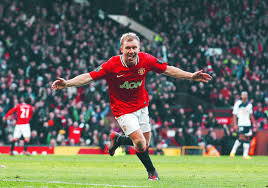In a sport where charisma often overshadows consistency, Paul Scholes stood apart not for what he said, but for what he did on the pitch. The ginger-haired midfielder from Salford never sought the spotlight, but he commanded the respect of some of football’s greatest icons. Zinedine Zidane called him “undoubtedly the greatest midfielder of his generation.” Xavi and Iniesta, masters of the tiki-taka, openly admired him. And Sir Alex Ferguson built dynasties with him at the heart of Manchester United’s midfield.
Yet, for all his accolades, Scholes rarely received the global fanfare that surrounded his contemporaries. That was by design. Scholes didn’t need the lights his football spoke louder than words ever could.
The Engine Room of Manchester United
Scholes joined Manchester United’s first team in 1994, just as the “Class of ’92” began reshaping English football. While David Beckham had the flair, Ryan Giggs the speed, and Gary Neville the vocal leadership, it was Scholes who provided the control.
He was the heartbeat of United’s midfield for nearly two decades. A complete player, Scholes was equally capable of breaking up play as he was of launching attacks with inch-perfect passes or thunderous long-range shots. His vision, composure, and football intelligence made him the bridge between defense and attack often making the extraordinary look routine.
Over the course of his career, Scholes won 11 Premier League titles, 2 Champions League trophies, and numerous domestic cups. Yet, he remained as understated in victory as he was in life.
A Player’s Player
Paul Scholes wasn’t just admired by fans he was revered by peers. Arsène Wenger once said, “Everyone wants to talk about Messi, Ronaldo, Ronaldinho, but for me, Scholes is a master.” His ability to dictate tempo, read the game several steps ahead, and unlock defenses with a single pass was unmatched in English football.
Despite being overlooked for individual awards, the testimonials from world-class players speak volumes. Andrea Pirlo, another midfield maestro, said Scholes was “the most intelligent player” he ever faced.
It’s easy to overlook players like Scholes in an era dominated by media narratives and highlight reels. But the true mark of greatness lies in influence and Scholes influenced an entire generation of midfielders.
Redefining the Midfielder’s Role
Before Scholes, English football valued box-to-box energy, tough tackling, and physical dominance. Scholes added finesse, subtlety, and tactical brilliance. He showed that a midfielder didn’t need to be 6’2” or sprint up and down the pitch endlessly. He proved that intelligence, timing, and technique could control a match better than brute strength.
In many ways, Scholes was the prototype for the modern central midfielder blending defensive awareness with attacking creativity. Players like Luka Modrić, Thiago Alcântara, and Frenkie de Jong owe much of their positional identity to the quiet revolution Scholes led at Old Trafford.
The Comeback and the Legacy
When Scholes retired in 2011, United felt his absence almost immediately. So much so that Sir Alex Ferguson called him back in 2012, and at age 37, he returned to help United win another Premier League title. It was a rare case in football: a legend leaving at the top, then returning not for glory, but to steady the ship.
That final season was quintessential Scholes: humble, efficient, brilliant. He retired again in 2013, this time for good, having made over 700 appearances for Manchester United.
Today, Scholes remains active in football as a pundit and occasional coach, but his legacy lives on most vividly in how we understand midfield play.
A Masterclass in Modesty and Mastery
Paul Scholes never needed a brand, a catchphrase, or a headline. He let his boots do the talking and they told a story of unmatched technical brilliance, vision, and consistency.
He was the footballer’s footballer. A master of the fundamentals. A quiet genius in a game too often dominated by noise.
In the history of football, some players change the game with flamboyance. Paul Scholes changed it with silence and a pass that split the defense.

